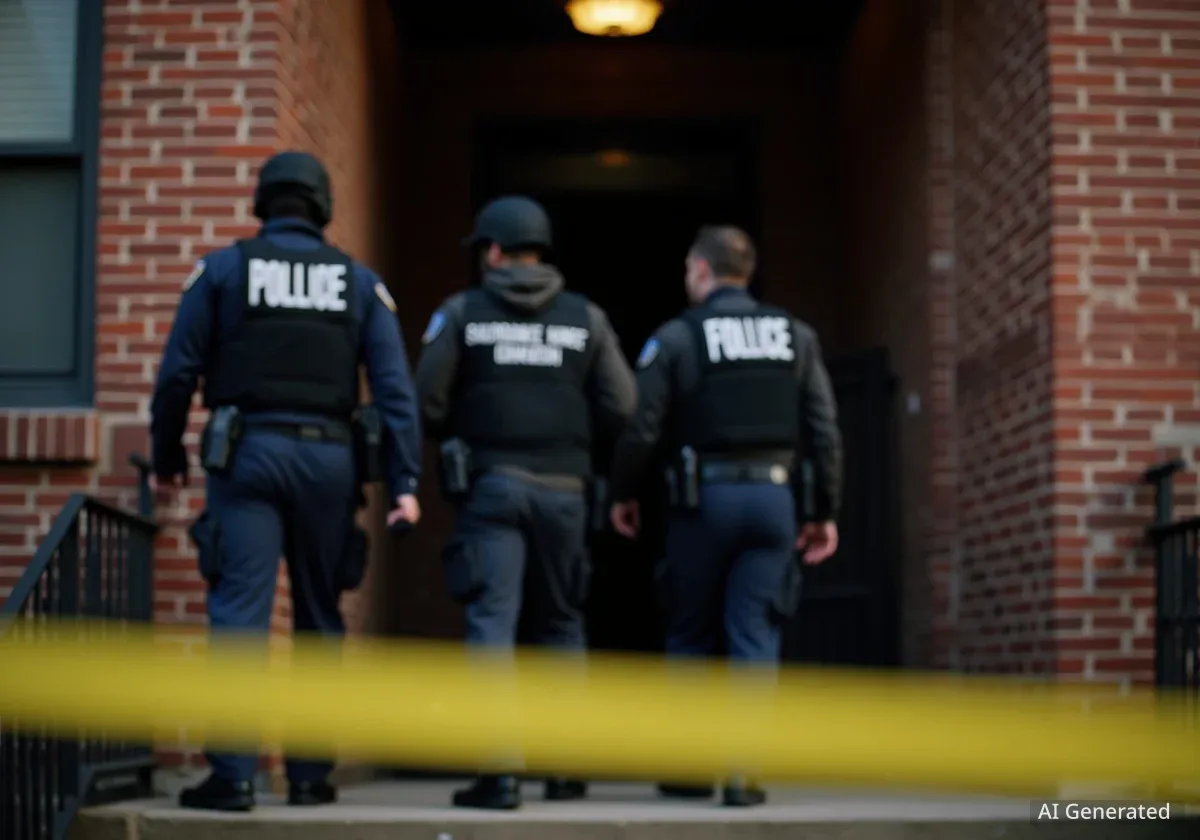A large-scale federal raid on a South Shore apartment building in Chicago, which resulted in 37 arrests, has brought to light a contentious $27 million foreclosure lawsuit between the property's owner and its lender. Court documents from the legal dispute reveal that city officials had been notified of significant safety and crime issues at the 130-unit complex weeks before the Department of Homeland Security operation took place.
Key Takeaways
- A federal multi-agency raid at 7500 South South Shore Drive led to the arrest of 37 individuals on September 30.
- The building's owner, Trinity Flood, is concurrently facing a $27 million foreclosure lawsuit filed by Wells Fargo.
- Legal filings indicate that Chicago officials, including the local Alderman's office, were aware of worsening criminal activity at the property prior to the raid.
- The foreclosure case involves disputes over missed loan payments and the high cost of lender-placed insurance.
- Top Illinois officials, including the governor and Chicago's mayor, have publicly criticized the nature of the federal operation.
Federal Operation Shakes South Shore Community
On September 30, residents of the South Shore neighborhood witnessed a massive law enforcement operation targeting an apartment building at 7500 South South Shore Drive. The raid involved multiple federal agencies, including Customs and Border Protection (CBP), the Bureau of Alcohol, Tobacco, Firearms and Explosives (ATF), and the Federal Bureau of Investigation (FBI).
Eyewitnesses reported seeing hundreds of agents arriving in unmarked vans and rental trucks. According to NewsNation, which was present during the operation, agents also descended from military-style helicopters. The large-scale deployment caused significant disruption in the community, with many residents documenting the events on social media.
Arrests and Official Justification
The Department of Homeland Security (DHS) later confirmed that the operation resulted in the arrest of 37 people. In an official statement, the agency said that a preliminary review found the individuals were undocumented. The subjects were also “believed to be involved in drug trafficking and distribution, weapons crimes, and immigration violators.”
Reports from the scene indicated that many tenants of the building, including U.S. citizens and children, were temporarily detained outside while agents conducted their search. This aspect of the operation has drawn criticism from community members and public officials.
Rising Immigration Enforcement in Chicago
The South Shore raid occurred amid a period of heightened immigration enforcement activity in Chicago. On the same day, federal agents reportedly used tear gas in the Logan Square neighborhood and were involved in a confrontation with an Alderwoman in Humboldt Park, according to Block Club Chicago. These events have sparked protests and criticism from immigrant rights advocates concerning due process.
Underlying Financial and Legal Turmoil
While the raid captured national attention, an ongoing legal battle in civil court provides crucial context. The building's owner, Wisconsin-based investor Trinity Flood, is facing a major foreclosure lawsuit from Wells Fargo. The bank initiated the action over a portfolio of properties, including the South Shore building, seeking to recover approximately $27 million.
The lawsuit alleges that Trinity Flood defaulted on loan payments and, critically, failed to maintain proper insurance on the property at 7500 South South Shore Drive. This lapse in insurance coverage is a central point of contention in the case.
The Insurance Dispute
Trinity Flood has contested the bank's claims, arguing that the lender-placed insurance plan Wells Fargo implemented was far more expensive than the building's previous policy. The owner alleged in court filings that the new insurance was based on “inflated property values,” and used this dispute to argue against the bank's emergency request to appoint a receiver for the property.
On October 1, the day after the federal raid, a judge reviewed Wells Fargo's request to appoint Matthew Tarshis of Frontline Real Estate Partners as a receiver to manage the property. The judge deferred the decision, leaving the building's management in place pending further hearings.
City Was Aware of Building's Problems
A legal filing by Wells Fargo stated that Chicago code inspectors had visited the property just two weeks before the raid. The document also claimed, “The City has received reports from (a) tenants’ rights group and the Alderman’s office that conditions continue to worsen at the property.” The filing described the building as “unsecured,” allowing non-tenants access, and noted “increased criminal activity and shootings.”
Political Reaction and Landlord Response
The federal operation prompted strong reactions from Illinois politicians. Governor J.B. Pritzker condemned the raid on social media, writing, “ICE is running around Chicago harassing people for not being white.”
“The South Side of Chicago is under siege with (President Trump’s) federal agents that are terrorizing our communities, where Black families are being awakened in the middle of the night with masked armed men with high power weapons in their face,” Chicago Mayor Brandon Johnson stated during a press conference.
Alderman Gregory Mitchell, who represents the area, has not issued a formal statement. It remains unclear what, if any, communication occurred between city and federal officials before the operation. Representatives for Trinity Flood and Wells Fargo did not respond to requests for comment.
Landlord Groups Weigh In
The incident has also drawn comments from local landlord organizations. Michael Glasser, president of the Neighborhood Building Owners Alliance (NBOA), emphasized cooperation with law enforcement while respecting tenant rights.
“Our housing providers will always respect a lawfully issued warrant and comply with their legal obligations,” Glasser said. “We want to cooperate with law enforcement in addressing criminal activity while upholding our fundamental responsibility to keep our tenants safe and secure, and to respect their privacy and their rights.”
The situation also touches on a new Illinois law taking effect January 1, which will allow police to remove unauthorized occupants, or “squatters,” from residential properties without a court-ordered eviction. John Warren of the Squatters Legislation Task Force expressed hope that the new law would prevent similar situations from escalating to such a degree in the future.





